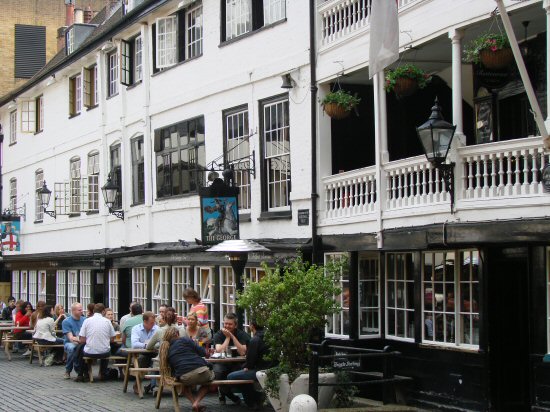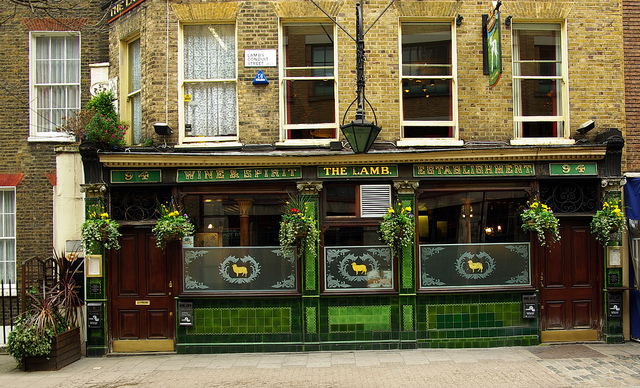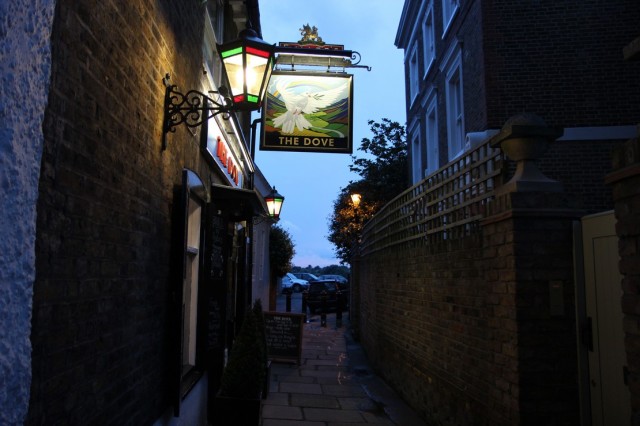Bookish Boozers
It is an all-too-common scenario: a friend is visiting London, and you want to take them out for a pint at a ‘traditional’ British pub, but, being a person of some distinction (you read The Holborn after all) you also want to wow them with your smarts and literary knowledge (and not end up in a J D Wetherspoons).
Well, I’m here to help.
Perhaps not as famous for its literary watering holes as say, Dublin, London still has a great many pubs with proud literary histories.

The Fitzroy Tavern
Arguably the most well-known is the Fitzroy Tavern on Charlotte Street (16 Charlotte St, London W1T 2LY), which is believed to be Fitzrovia’s namesake. Frequented by a whole host of well-known bohemian writers in the 1930s, its regulars included George Orwell, Virginia Woolf and Dylan Thomas. Now owned by chain pub-owning giant Samuel Smith Brewery, it still retains most of its unique charm. It is jam-packed with punters most nights and the beers are very cheap (some under £2! Unheard of!). Ensconced amongst some wonderful restaurants and bars, The Fitzroy would be a good first stop on a night out to soak up a little of London’s literary past.

The George Inn
The George Inn on Borough High Street (75-77 Borough High St, Southwark, London SE1 1NH) is London’s only remaining galleried coaching inn, and was (at least once) visited by the one and only Charles Dickens, who then went on to mention it specifically in Little Dorrit. It is also thought to have been ‘Shakespeare’s local’, though proof remains unsupported as to whether or not the bard ever truly set foot in the establishment. Regardless, it is a lovely historic pub in a great location, with decent food and service.

The Lamb
It would be a disservice to this list not to include The Lamb on Lambs Conduit Street (94 Lamb’s Conduit St, London WC1N 3LZ) in Bloomsbury. Once a regular haunt of Charles Dickens, who lived around the corner in Doughty Street in the late 1830s, The Lamb is a sort of upmarket pub with a distinctly homely, traditional feel. If its Dickensian past wasn’t ‘writerly’ enough, it also played host to many a romantic rendez-vous between Sylvia Plath & Ted Hughes in the early 1950s.

The Dove
Heading out west, we have The Dove in Hammersmith (19 Upper Mall, Hammersmith, London W6 9TA) which not only boasts the World’s Smallest Bar Room (see if you can find it), but has also played host to a number of notable wordsmiths throughout its long history. The poet James Thompson allegedly wrote the words to Rule, Britannia here. Ernest Hemmingway and Dylan Thomas are two more weighty names said to have clinked glasses at The Dove. If you catch London on a rare sunny day (or if your friend happens to be visiting around the time of the Oxford-Cambridge boat race), it is a wonderful waterside spot to grab a beer.

The Pillars of Hercules
The Pillars of Hercules is an old rickety pub on Greek Street (7 Greek St, London W1D 4DF). With an average selection of ales and lagers and somewhat questionable, hit-and-miss service, it may have somewhat lost its charm these days. However you can excuse all that, because of its rich literary history. The Pillars of Hercules was a bustling hotspot for the London literary set in the 1970s – Clive James’ second collection of literary criticism is named after it (At the Pillars of Hercules, 1979) due to most of its contents being written there. Ian McEwan, in a recent interview with the Guardian, said “Who would want to hang out around the Pillars of Hercules? Only those bent by this passion for writing books. We were absolutely determined to become writers. We didn’t use words like ‘passion’, but we acted them out. Writing was the only important thing.” It was here McEwan met Christopher Hitchens and formed a connection with Martin Amis and Julian Barnes. Perhaps its Soho location gives the Pillars a vague sense of pretension, but I maintain it has a good long list of names you can casually drop into conversation with your utterly impressed visiting friend. Do mind the crowds.
Even in a city so overflowing with the bizarre and exciting tales of its own history, it is somehow all too easy to step out for a drink and step in to a boring oversized chain pub which appears to have developed a (carpeted) dance floor. Instead, make a beeline for one of these little gems and spin a yarn about Sylvia Plath’s love life. I assure you, your friend will appreciate it.
(There is in fact a London literary pub crawl available to do – http://www.londonliterarypubcrawl.com/ – where the group is guided through the city by actors dressed as ghost writers! As in, the ghosts of writers. Not people who ghost-write.)
Evelyn Levisohn
